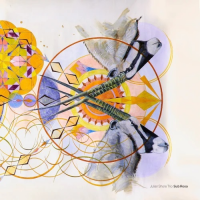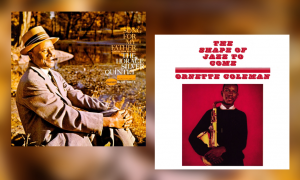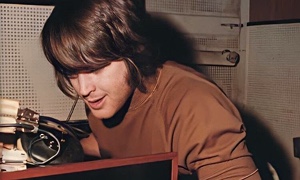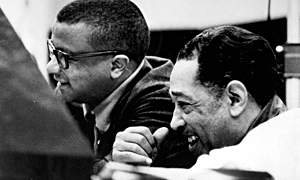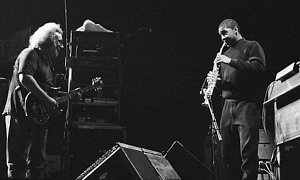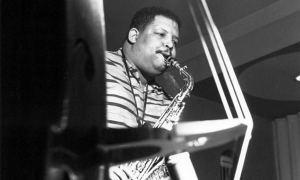Home » Jazz Articles » Building a Jazz Library » Hard Bop: An Alternative Top Ten
Hard Bop: An Alternative Top Ten

Courtesy Francis Wolff
We°ѓd be making a tape and Alfred Lion would be walking around, (snap) °ЃMmm!°ѓ (snap) °ЃOoh! (snap). °ЃNow vait a minute, it don°ѓt sving, it don°ѓt sving!°ѓ So we°ѓd stop and laugh, then come back and slow it down just a bit. Then he°ѓd say, (snap) (snap), °ЃFine, fine, dot really svings. Ja!
—Hank Mobley
In an attempt to dodge those hurdles, the list which follows takes a route a little less travelled and excludes the genre's most celebrated releases, among them:

Miles Davis
trumpet1926 - 1991

Sonny Rollins
saxophoneb.1930

Thelonious Monk
piano1917 - 1982

Art Blakey
drums1919 - 1990

Charles Mingus
bass, acoustic1922 - 1979

Hank Mobley
saxophone, tenor1930 - 1986

John Coltrane
saxophone1926 - 1967

Lee Morgan
trumpet1938 - 1972

Horace Silver
piano1928 - 2014

Larry Young
organ, Hammond B31940 - 1978

Joe Henderson
saxophone1937 - 2001

Wayne Shorter
saxophone1933 - 2023
To narrow the focus further, the list below also sticks to the straight-ahead strand of hard bop. It excludes experimental late-period works such as " data-original-title="" title="">Grachan Moncur's Evolution,

Andrew Hill
piano1931 - 2007

Eric Dolphy
woodwinds1928 - 1964

Jackie McLean
saxophone, alto1932 - 2006
So, assuming you already have the albums referred to above, here are ten more to look out for, some well known, most less so. Hopefully you will find one or two fresh delights among them.
HARD BOP: A ROAD LESS TRAVELLED
 Howard McGhee
Howard McGhee Howard McGhee Vol. 2
Blue Note, 1953
There is much argument about who made the first hard bop recording. The discussion ignores the fact that synchronicity played as big a role in the creation of the style as it has it in the birth of any cultural movement, with a community of musicians simultaneously absorbing the zeitgeist through a kind of collective osmosis. Two of the most frequently cited contenders for this dubious "first prize" are Miles Davis' All Star Sextet (Prestige) and Art Blakey's A Night At Birdland Vol. 1 (Blue Note), both recorded in spring 1954 and released around three months later. Each features Horace Silver on piano. Both were preceded by a clear twelve months by

Howard McGhee
trumpet1918 - 1987

Gigi Gryce
saxophone1927 - 1983

Tal Farlow
guitar1921 - 1998
 Kenny Clarke
Kenny Clarke Bohemia After Dark
Savoy, 1955
You cannot keep a good man down—Horace Silver is the pianist here, too. Other hard bop early birds present include

Cannonball Adderley
saxophone1928 - 1975

Nat Adderley
trumpet1931 - 2000

Donald Byrd
trumpet1932 - 2013

Paul Chambers
bass, acoustic1935 - 1969

Kenny Clarke
drums1914 - 1985

Oscar Pettiford
bass1922 - 1960
 Sonny Clark
Sonny Clark Cool Struttin'
Blue Note, 1958
In his introduction to The Blue Note Years: The Jazz Photography Of Francis Wolff (Rizzoli, 1995), Charlie Lourie told a story from the Blue Note Festival held at the foot of Mt. Fuji in Japan in 1986, at the height of hard bop's rediscovery by a new generation of Japanese listeners. "Where else but in Japan," said Lourie, "can one see a field packed with fifteen thousand teens and twentysomethings roar with excited recognition at the first four bars of Sonny Clark's 'Cool Struttin'?" Clark's album epitomises Blue Note's hard bop aesthetic and the band is similarly totemic:

Art Farmer
flugelhorn1928 - 1999

Philly Joe Jones
drums1923 - 1985
 Freddie Redd
Freddie Redd Music From The Connection
Felsted, 1960
The elephant in the studio with practically every hard bop album recorded in the 1950s and early 1960s was heroin. Most if not all of the discs cited in this article included at least one habitual user in the lineup and usually more than one. On occasion the entire band was strung out. An uncomfortable truth about heroin is that it creates an extraordinary intensity of focus. Even

Gil Evans
composer / conductor1912 - 1988

Freddie Redd
piano1928 - 2021

Tina Brooks
saxophone, tenor1932 - 1974
 Tina Brooks
Tina Brooks True Blue
Blue Note, 1960
Tina Brooks made four albums under his own name for Blue Note between 1958 and 1961, of which True Blue was the only one released during his lifetime. It is said that
Alfred Lion
producer1908 - 1987

Freddie Hubbard
trumpet1938 - 2008
 Harold Land
Harold Land The Fox
HiFi, 1960
Like Tina Brooks' career,

Dupree Bolton
trumpet1929 - 1994

Harold Land
saxophone, tenor1928 - 2001

Curtis Amy
saxophone1927 - 2002
 Miles Davis
Miles Davis In Person Friday And Saturday Nights At The Blackhawk Complete
Sony International, 2003 (recorded 1961)
OK, it is a bit of a cheat, as this box set includes four CDs, and single disc versions have been released. But just as fans of Davis' new wave 1965—1968 quintet have to have the seven CD The Complete Live At The Plugged Nickel 1965 released by Columbia in 1995, rather than the single CD alternative, so fans of Davis the hard bopper have to have the complete Blackhawk set. The band is hard bop perfection: Davis plus Hank Mobley,

Wynton Kelly
piano1931 - 1971

Jimmy Cobb
drums1929 - 2020

Bill Evans
piano1929 - 1980
 Curtis Fuller
Curtis Fuller Boss Of The Soul-Stream Trombone
Warwick, 1961
One of a handful of hard bop albums released by the shortlived New York indie Warwick, whose major earner was rock 'n' roll combo Johnny & The Hurricanes. On Boss Of The Soul-Stream Trombone, nominal leader Curtis Fuller, after

J.J. Johnson
trombone1924 - 2001

Yusef Lateef
woodwinds1920 - 2013

Grant Green
guitar1935 - 1979
Ernie Farrow
bassb.1928

Alice Coltrane
piano1937 - 2007

Freddie Hubbard
trumpet1938 - 2008

Herbie Hancock
pianob.1940
 Grant Green
Grant GreenFeelin' The Spirit
Blue Note, 1962
Hard bop was memorably described as "The Power Of Badness" by its biographer, the writer David H. Rosenthal, in 1992. Rosenthal had Lee Morgan particularly in mind, but he was describing the vibe of recordings such as Morgan's "The Sidewinder," not Morgan himself, who was by all accounts a sweet natured man. The blues roots of hard bop provided the badness, but the style was also informed by the music of the African American church.

Grant Green
guitar1935 - 1979
 Randy Weston
Randy WestonRandy! (Bap!! Beep Boo-Bee Bap Beep-M-Boo Bee Bap!)
Bakton, 1966
Reissued as African Cookbook by Atlantic in 1972, when Randy! was recorded in 1964,

Randy Weston
piano1926 - 2018

Booker Ervin
saxophone, tenor1930 - 1970
Ray Copeland
trumpetb.1926
Lenny McBrowne
b.1933
Big Black
congasb.1937
Tags
Comments
PREVIOUS / NEXT
Support All About Jazz
 All About Jazz has been a pillar of jazz since 1995, championing it as an art form and, more importantly, supporting the musicians who make it. Our enduring commitment has made "AAJ" one of the most culturally important websites of its kind, read by hundreds of thousands of fans, musicians and industry figures every month.
All About Jazz has been a pillar of jazz since 1995, championing it as an art form and, more importantly, supporting the musicians who make it. Our enduring commitment has made "AAJ" one of the most culturally important websites of its kind, read by hundreds of thousands of fans, musicians and industry figures every month.





 Buy Now
Buy Now




